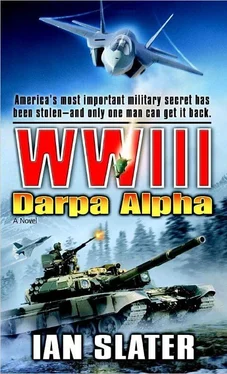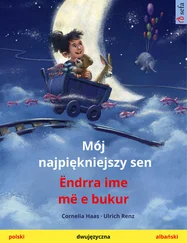“Hoo ha!” came the marine reply. Melissa Thomas’s smile was tired and patient, the smile of a woman who had heard much more gauche comments from grown-up boys.
Freeman became serious again. “This isn’t going to be a cakewalk but I’m confident we’ll be able to reach that exit door if this map is right, and remember the approach to it won’t be mined, otherwise it wouldn’t be a damned exit! Questions?”
Aussie asked about the entrance to the tunnel. If Freeman attacked the exit, wouldn’t ABC’s technicians be able to escape back out the entrance?
“Doesn’t matter if they do,” replied Freeman. “Right now we’re after the machinery more than the men.” He paused, checking that everyone was ready. “Right,” he said, “check your weapons. Remember, condoms on the barrels so snow doesn’t get up the spout and freeze the rifling. Got it?”
“Got it.”
“Good.”
With the chaotic roar of the helos fading as quickly as it had begun, Freeman’s force moved off in the relative silence, broken here and there only by sporadic “blind man’s firing,” as Freeman called it. A hundred yards out, the marine corporal, sitting in the Hummer, could have sworn he heard a squeaking sound. He also knew hearing it was like watching clouds; you often see the image that the mind projects, and sometimes you hear noises that aren’t there, sounds born of imagination and the circumstances of the kind the corporal was encountering now in the conditions of war with the Russian terrorists, of whom he’d seen very few, except for those in the ill-fated BTR and the truck, wanting to kill every American they could find. The damp air all around was thick with the pungent smell of burning gasoline and high-explosive fumes rising slowly from those places in the minefield moat where more than forty Americans, their transport Stallion thrown off course by the Black Sharks, had perished as it hit the ground, its huge rotors cartwheeling and breaking up, the fuselage suddenly bursting into flame.
Abramov had been holding back his twenty T-90s behind the protection of the minefield that skirted ABC’s H-block and the thicket of Cherkashin’s anti-aircraft defenses until the weather abated and visibility improved enough to unleash his armor and make devastating use of his laser and infrared targeting. But he suspected now that he had made an error and waited too long. Initial reports coming into the H-block from Beria’s lone-sniper observers in reed hides at the edge of the minefield indicated that “white bears” now outnumbered “brown,” which told Abramov, Beria, and Cherkashin that not only had a second wave of Americans arrived but that these new American arrivals were equipped with “snow whites,” or winter uniforms.
Then suddenly, and completely unexpectedly, Beria burst into Abramov’s office, waving a piece of yellow paper of the size ABC had given Ramon, who had so successfully led ABC’s Spetsnaz commando group in the attack on the American’s DARPA ALPHA base.
“God exists!” Beria bellowed to a startled Abramov. “Mikhail, I bring you a gift!”
“What in hell are you talking about?” asked the tank commander, looking up grumpily at the diminutive Beria, whose chin seemed barely to clear the top of Abramov’s huge metal desk.
“Where’s Cherkashin?” Beria inquired loudly, looking about the map room adjoining Abramov’s office.
“He’s busy,” said Abramov brusquely, clearly irritated by Beria’s exuberance, which was in marked contrast to his own bad mood and anger at himself for not having committed his tanks earlier. It had been his dream to avenge the one humiliating defeat his Siberian Sixth had suffered.
Abramov had been smart enough this time around, or so he had told himself, to not let his tanks loose when Bird Rescue’s Cobra gunships had shown up in the first wave. His intel group had assured him the Cobra attack helos would not return in the terrible weather. The gunships simply were not equipped with sufficiently good avionics, given the distance between the U.S. fleet and Lake Khanka. Furthermore, his perimeter snipers had been told that if the Cobras did risk a second wave, they would, like any other helo, be vulnerable when refueling from bladders dropped by the cargo-hauling Stallions. Any in-flight refueling was deemed to be “out of the question” during the blizzard. Cherkashin’s air defense had assured Abramov that such a delicate maneuver required visuals as well as outstanding instrument flying by the Cobra’s two-man crew and the tanker’s pilot in what the Russians referred to as a “Tit and Sucker” maneuver. But Abramov’s G-2, his intelligence chief, had confirmed that there were reports by coastwatchers of American helos refueling in the air.
Beria had placed the yellow sheet of paper, which was also the color used for radio intercepts, on Abramov’s desk, waving his hand side to side as if to clear the room of the smoke from the ultraexpensive Diplomaticos No. 2 cigar, one of which Abramov always had on the go, ever since ABC’s massive profits had enabled the tank commander to buy the very best Havana cigars.
“What’s this?” Abramov asked, picking up the yellow intercept strip unenthusiastically. Beria strode to the window, momentarily struggling with the latch, and letting in a draft of the frigid air, glancing at Abramov’s snow-covered main battle tanks surrounded by Cherkashin’s twelve multibarreled ZSU anti-aircraft units and a score of Igla MANPAD teams. Beria thanked his lucky stars, that, as much as Moscow wanted ABC destroyed, the Russian president simply could not allow any foreigners, especially Americans, to bomb Russian soil, rebel or otherwise. For the Russian president to allow anyone, especially Americans, to bomb would risk enraging even those Russians who, though opposed to the terrorist activities of ABC, could not tolerate foreign bombs falling on the Motherland. It was a visceral reaction born of the collective trauma of Hitler’s Operation Barbarossa, the massive and savage invasion of Mother Russia, when Hitler’s Luftwaffe had sent in the Nazis’ Screaming Stuka dive-bombers to pulverize Russian defenses and terrify the civilian population.
Looking out the window as Abramov scanned the yellow page, an excited Beria was reveling in ABC’s double good fortune. First, in how Moscow, by securing a “no-bombing” agreement with the U.S. president in dealing with ABC, had in effect rendered ABC’s H-block and minefield off-limits to American aircraft and now ABC’s second lucky break, which had come in the form of an intercepted transcript of a message between the American General Freeman and the marine commander, Colonel Tibbet.
“The Americans,” said Beria, coming back to the desk, his finger tapping the yellow sheet of paper, “think they are the only ones with state-of-the-art computer scanners?”
“So,” said Abramov, still not convinced, “you have intercepted a line of letters. What’s it mean?”
“Our intel boys are working as fast as they can. They think it’s a letter-for-letter code. You know, each letter stands in for another letter. So when you put ‘B’ it could be ‘A’ or ‘C.’ We’re running the parameters now.”
“Why isn’t it encrypted?” asked Abramov brusquely. Digitized?”
Beria shrugged. “Not every squad carries an encrypter. Maybe their encrypter wasn’t working.”
“Huh,” said Abramov. “It looks too easy.”
“Well, then,” countered Beria. “What does it say?”
“I don’t know,” admitted Abramov, taking a long, clenched-teeth drag on his Diplomaticos. “I’ve just seen it this second, haven’t I?”
“Our boys’ll crack it,” said Beria confidently, taking back the yellow strip.
Читать дальше












